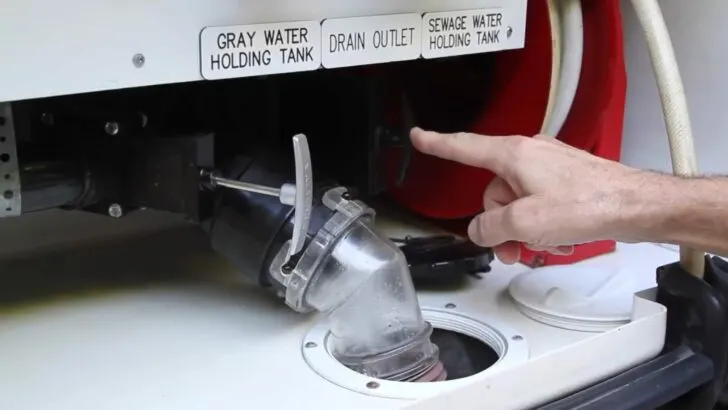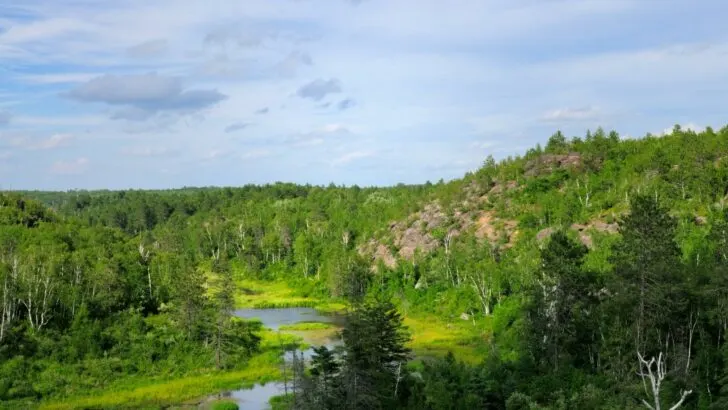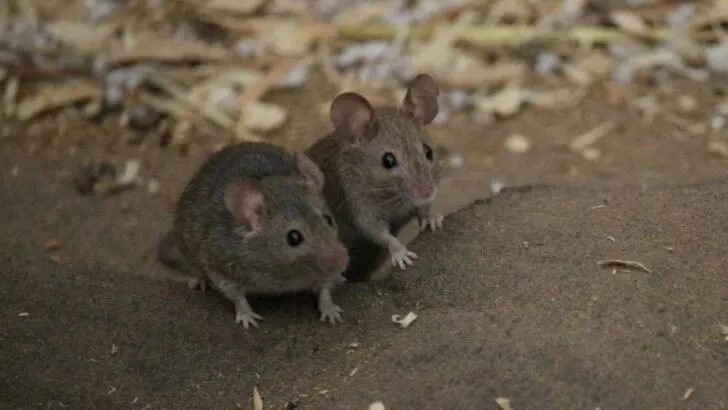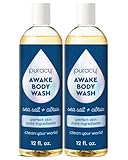RVers who enjoy boondocking or dispersed camping (camping outside of a designated campground) often ask us this question: “Can you dump RV gray water on the ground legally?” It’s an interesting question, and we’ve got some answers because we’ve been avid boondockers for nearly two decades now.
Before we go much further — a brief note: This is a post about dumping gray water. It’s also a post about dumping grey water. ???? Every now and again we’ll receive a comment on our spelling of the word “gray” vs “grey” when referring to the tank that holds the water from the sinks and shower on our rig. We use them both interchangeably, partly because we’ve RVed in England and other commonwealth countries, where grey is de rigueur! ????
Now that we’ve gotten that minor detail out of the way, let’s get down to the nitty-gritty about whether it’s legal to dump grey water (and gray water!) on the ground when you’re camping.
What is RV Grey Water?
As you may recall from our post “What Is an RV Gray Water Tank?,” your RV’s gray water tank catches and collects your shower water, and the water from your kitchen and bathroom sinks. It also contains things like food particles from washing dishes, toothpaste, soap, body oils, shaving cream, etc.
Everything that runs down your shower and sink drains goes into your gray tank. So, since gray water tank contains more than just water, it’s reasonable to question whether dumping gray water is legal – or even environmentally sound.

Gray water (or grey water) is the term used for all of the water that drains from an RV sink or shower.
Is it Illegal to Dump Grey Water on the Ground?
This is the main question we’re exploring in today’s post, and there are a few technicalities to keep in mind. The easy answer to the question is that it is indeed illegal to dump gray water on the ground in some places. So you need to learn and follow local laws, rules, and regulations wherever you do your dispersed camping.
But let’s take a look at some common examples in an effort to delve into the question a little more deeply. Many people enjoy dispersed camping on federal lands. In the United States, there are six federal land management agencies. They are:
- Bureau of Land Management (BLM)
- U.S. Forest Service (USFS)
- National Park Service (NPS)
- U.S. Bureau of Reclamation (USBR)
- Army Corps of Engineers (COE)
- U.S. Fish & Wildlife Service (USFWS)
Of these six, only the Bureau of Land Management (BLM) permits dumping gray water on the ground. The BLM controls more public lands than any other federal agency in the U.S., and free camping is allowed on approximately 98% of BLM land (though much of it isn’t accessible to a typical RV).
While the BLM may permit you to dump RV grey water on the ground in some places, note that state laws will prevail, so it’s important to know the laws in the state where you’re camping as well. More on that in just a bit.
But here’s where it gets a bit tricky. There are four subdivisions within the BLM:
- Public Lands
- Developed Recreation Areas
- Wilderness Areas
- Conservation Lands
Camping is allowed in all four subdivisions but regulations vary for each.
To simplify without getting into the specific rules for each of the federal lands and each BLM subdivision, it’s legal to dump RV gray water on the ground when dispersed camping on BLM lands as long as you’re in the “Public Lands” subdivision.
It’s illegal to dump the contents of RV gray tanks on the grounds of developed recreation areas, wilderness areas, and conservation lands.

It’s important to know what type of federal land you’re camping on as each has different regulations. For example, it is not legal to dump the contents of RV gray tanks on the grounds of developed recreation areas, wilderness areas, and conservation lands.
It’s important to note that BLM documentation uses the term “wash water” to refer to RV grey water. This is likely because campers often have “wash water” that isn’t held in RV tanks. For example, someone who’s tent camping may have their wash water in a basin of some type.
The most important thing to know is that the term “wash water” used by the BLM refers to water used for washing. Washing people, washing dishes, brushing teeth, washing the dog, etc. Again, for an RVer, this will be water that drains from your showers and sinks.
So, dumping grey water or wash water is allowed on some BLM public lands. On other subdivisions of BLM land, there may be infrastructure provided for dumping your grey water tank – typically an RV dump station.
But grey water dumping may not be allowed in other locations where boondocking is permitted, and it’s very important to know and follow all laws (state and local) as well as the policies of the land owner.
For example, if you’re a member of Harvest Hosts, you may be technically boondocking (dry camping), but you’re NOT invited to dump your gray tank on the ground at ANY location. (This should be a matter of common sense, but we’ll say it anyway.)
You’re also not invited to dump gray water on the ground of any developed campgrounds and certainly not in recreational areas or rest areas. This is for very good (and hopefully, obvious) reasons.
What Harm Can Come from Dumping Grey Water?
In some places dumping RV grey water is prohibited because it often contains food scraps. This means that dumping gray water on the ground can attract animals. You don’t want to attract wildlife to your campsite, nor do you want to draw them to an area where others are camping. Animals that get habituated to human food can become a problem, can develop health issues (their normal diets are not usually the same as ours ????), and may need to be captured and/or killed if they pose a hazard to humans.

Small food scraps or even the scent from food in your gray water can attract all sorts of critters to your campsite.
More importantly, some soaps may be very harmful to wildlife, and to the environment. Some dish soap, for example, is made from petroleum products which can be harmful to animals. But it’s not only wildlife that may be adversely affected. Pets who camp in the same area after you’ve dumped your gray water may also be harmed by these types of products.
Certain soaps, such as those containing petroleum products, can also contaminate water sources if you dump gray water on the ground nearby. This is another reason why many private, local, and state policies prohibit the dumping of grey water on the ground.
Even if you’re taking advantage of dispersed camping on public land, your gray water may drain into underground aquifers that lead to water sources that ultimately become drinking water such as rivers, streams, lakes, and reservoirs. So, it’s important to know the regulations and abide by them.
It’s also very important to use biodegradable soap when camping or RVing in areas where it’s legal to dump your grey tank on the ground. This way, at least you know that anything you send to the ground won’t be harmful to animals, water sources, or to the environment in general. (Remember, though, that food particles, in addition to attracting animals, can also be harmful to them.)
Here are a few of the most popular options for biodegradable soaps:
- MADE WITH ORGANIC OILS & CERTIFIED FAIR TRADE INGREDIENTS: Dr. Bronner's Pure-Castile Liquid Soaps are made with over 70% certified organic & fair...
- ORGANIC & FAIR TRADE PALM KERNEL OIL: Grown by fairly-paid smallholder farmers in Ecuador to ensure sustainable harvesting techniques that won't...
- Moisturizing body wash leaves skin feeling smooth, soft, and refreshed
- Dermatologically tested
- Get the Senses Going and Energy Flowing: AWAKE Body Wash features a complex blend of natural sea salt, citrus, and other complimentary aromas to...
- Perfect Skin: Featuring Coco Glycinate and other premium natural ingredients, our AWAKE Body Wash will not disrupt the moisture layer of skin. This...
Despite the use of biodegradable soaps, we want to reiterate the importance of complying with state and local laws. There are many options for legal grey water dumping. If you’re not familiar with the laws in the areas where you’re boondocking, assume it’s NOT legal and plan to use any dump stations available to dump RV grey water (and black water). Dumping RV tanks at the nearest dump station is always your safest bet unless you know for sure that it’s legal to release the grey water from grey tanks onto the ground.
Bear in mind that most states have laws and/or regulations that fall either under the parameters of environmental quality or public safety. For this reason, checking state laws is wise even in areas (such as BLM land) where it’s legal to dump gray water. Otherwise, it’s possible that you could be cited for violating state laws in some places.
The Best Place to Dump Your Tanks is the Nearest Dump Station
Legal or not, we think that the best place to dump your tanks – yes, even your grey water tank – is at a dump station, or at a full hook-up campground or RV park. If you want to extend your time in one particular location off the grid without having to move your RV, read our post sharing 27 Boondocking Tips To Extend Your Next Trip. Conserving resources is a far better way to avoid a full gray tank than emptying it onto the ground.
One other option to deal with a full (or nearly full) gray water tank without moving your RV is through the use of a portable wastewater tote, commonly referred to as a “Blue Boy.” These will allow you to off-load grey water without moving your rig, and transport it to a dump station next time you’re out and about in your tow car. If you’re interested in one of those, we’d suggest checking out our post about the 3 Best Portable RV Dump Tanks. (They can of course be used for black water, too.)
- SIMPLIFY RV WASTE DISPOSAL: Make waste disposal hassle-free with Camco's portable waste tank. Easily transport waste from your RV black water tank to...
- EFFORTLESS TRANSPORT: Haul your waste with ease with no-flat wheels built for any terrain, an oversized handle for easy maneuvering, & a steel tow...
And even though this post is about the water from your gray tank that carries whatever drains from your bathroom sink, kitchen sink, and shower, we feel it’s imperative to note that nowhere – absolutely NOWHERE – is it legal or acceptable to drain sewage wastewater (also known as black water) onto the ground under any circumstances. Ever!
The contents of your RV black water tank must only be dumped at a dump station, a sewer connection at a full hookup campsite, or into a septic system, where permitted. Black tanks contain wastewater from the toilet, and nothing that drains out of a toilet and into a black tank should ever hit the ground.
Your black water tank contains raw sewage, which is why dumping toilet wastewater from your black tank onto the ground is not legal anywhere. And really, dumping wastewater, whether it’s black water from your toilet or even gray water, isn’t necessary. There are so many options for safely dumping grey water and black water tanks, and there’s usually one not far from wherever you are.
A while back we published a post on 5 places to dump your RV black water. You can check that out for some detailed options. But most campgrounds and RV parks have dump stations, as do many truck stops. Many cities and towns have sewerage districts that make a dump station available for a nominal fee. And many areas of the National Park Service offer the use of their dump stations for as little as $5 (or free, if you’ve paid to camp).
To us, dumping any type of wastewater – whether it’s gray water/grey water or black water – is a bad idea, and easy to avoid.
All waste calls for proper disposal, and waste WATER is no exception. Black water or grey water/gray water is all waste water, and it should all be properly disposed of for the safety and respect of humans, animals, and the environment.
Geek Out with Us Every Week
Join our newsletter to learn about all things RV-related. Every week we offer free tips, tricks, product reviews, and more to our online community of RVers. So, whether this is your first time on the road or you’re a seasoned expert, we’d love for you to geek out with us!






Mark Lafdin
Sunday 9th of July 2023
I’ve camped in everything from a tarp to a 45-foot DP over many decades. Throughout all that time, I have always done my best to adhere to the “Leave No Trace” principles (https://lnt.org/why/7-principles/). My philosophy has always been “if it wasn’t there then I arrived, it won’t be there when I leave.” Even in those situations where it may be legal to dump gray water, it doesn’t make it right.
When I camped or backpacked individually or in a small group, I certainly dumped the very small amount of waste water I created onto the ground, and I buried my human waste in correctly dug cat holes, and packed out my toilet paper. However, as my affluence increased and I was able to afford RVs, I would never think of dumping my gray tank on the ground, even if the BLM permits it. Simply put…it leaves a mess on the ground.
There are oils, food particles, dead skin cells, and detergents, and other things that don’t occur naturally on the ground or in the soil. The 20-60+ gallons of dumped waste leaves behind stuff that nature didn’t put there even after the liquid is absorbed or evaporates. I’m always disappointed and appalled when I arrive at a boondocking campsite to find trash, motor oil, used diapers, broken camping equipment, empty alcohol bottles and cans, paper and cardboard, discarded clothes, mattresses and others furniture, spent ammunition casings, rotting food, and human waste. Most people don’t appear to have any understanding and appreciation of or respect for the gift of public lands, and often turn pristine wilderness into trash dumps. Dumping gray water from RV gray water tanks onto the ground, even if legal, contributes to the degradation of our public lands. There are so many ways to dispose of gray water appropriately; I can’t think of a scenario where dumping it on the ground is necessary. We owe it to our fellow campers and future generations to leave no trace of our presence in our public lands.
Norman Smith
Saturday 8th of July 2023
The last C.O.E. that I was at in Arkansas had on the list of regulations when checking in, "you may dump your gray water on the ground"
Craig Benoit
Saturday 6th of May 2023
Backpackers and Tent campers always dispose of thier grey water on the ground, bathe in the streams, ponds and rivers, pee and poop behind the bushes. :-}
M
Sunday 9th of July 2023
@Craig Benoit, Hopefully pee and poop buried in a dug and then covered "cat hole" well away from open water and trails.
TheRVgeeks
Tuesday 9th of May 2023
That's true... but we have yet to see a backpacker or tent camper who, when doing that, releases 20-60 GALLONS of waste at one time! So individual "events" are less of an issue than a torrent of black/gray water! ????????
Rick
Sunday 17th of July 2022
You should save the gray water to wash out the dumping hose after you drain the black water.
Casey
Friday 15th of July 2022
Melaleuca Brand also sells a lot of Biodegradable Cleaning Products.